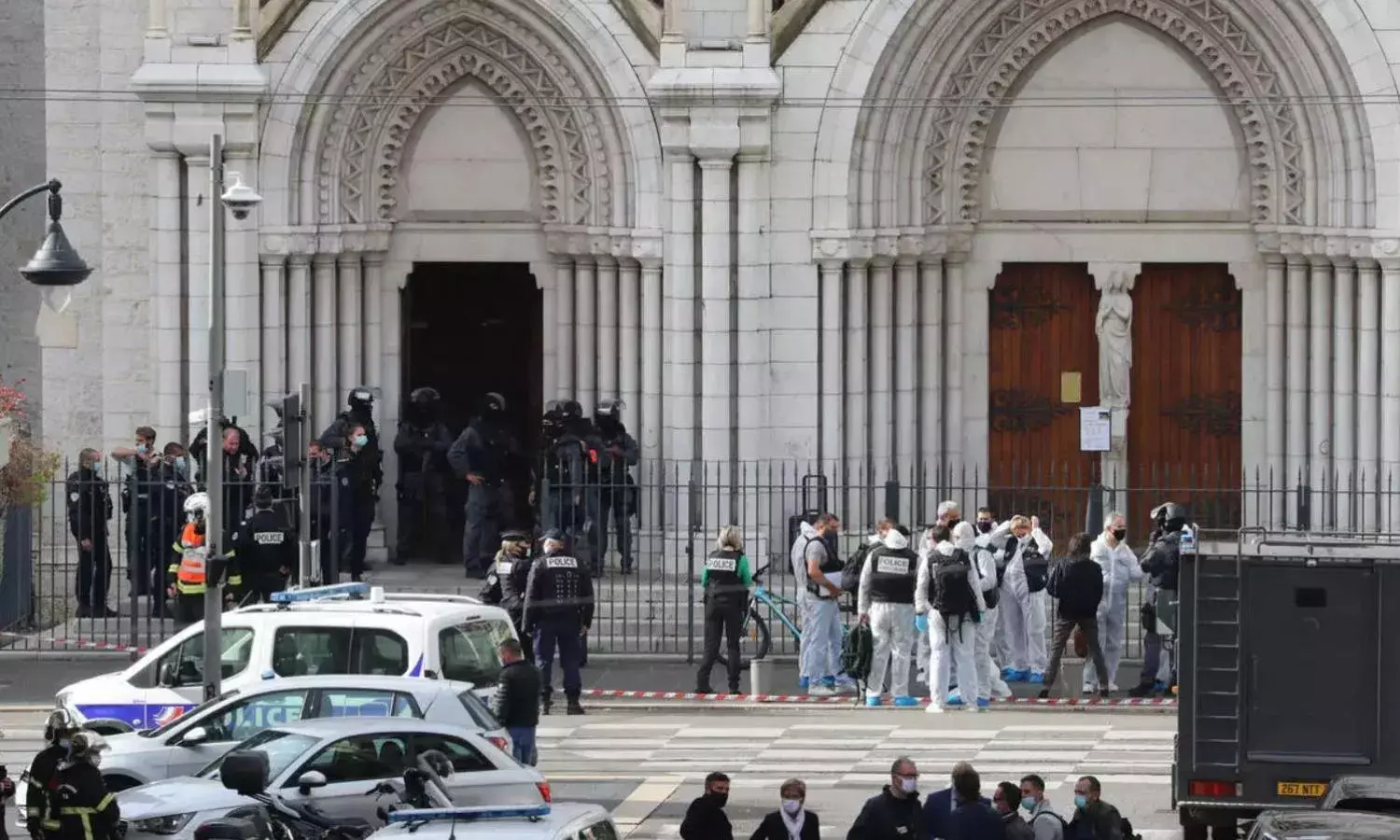Indian Muslims Condemn KIllings in France
“No ifs and buts”

In what officials suspect to be a “terrorist attack”, a man wielding a knife beheaded a woman and killed two others near a church in Nice, France on October 29. The attack took place nearly two weeks after the beheading of a French teacher Samuel Paty near Paris on October 16.
Following the killings, Indian Muslims released statements condemning the attacks, calling for the perpetrators to be brought to justice and demanding the abolition of apostasy and blasphemy laws.
Christian Estrosi, the mayor of Nice, tweeted that the latest attack took place in or near the city’s Notre Dame church and that the attacker repeatedly shouted “Allahu Akbar”, even after being detained by the police. "The suspected knife attacker was shot by police while being detained, he is on his way to hospital, he is alive," Estrosi told reporters.
A statement signed by activists and academics including Shabnam Hashmi, Syeda Hameed, Sadique ur Rehman Kidwai and the Muslim Women’s Forum among others, unequivocally condemned the “brutal and inhuman killing of three women and the school teacher Paty, in France by extremists.”
Asserting that these killings are “anti-Islam”, the signatories stated, “We remind ourselves of the Quranic injunction - “killing an individual is like killing an entire quam (humanity)”.”
“Such an act cannot be accepted by any democratic and civilised society,” they said, adding that the perpetrator should be brought to justice quickly and that all arguments and differences should be resolved non-violently.
Other signatories to this statement include Azra Kidwai, Jamal Kidwai, SMY Nadeem, Surraiya Nadeem, Safia Mehdi, Mahdooma Majid, Rehana Mishra, Samina Mishra and Reyaz Ahmad.
Earlier, on October 26, Muslim intellectuals and academics speaking at a webinar organised by the Indian Muslims for Secular Democracy (IMSD) condemned the Paris beheading of school teacher Paty.
“We are here to condemn in unequivocal terms, no ifs and buts, not only the man responsible for this barbaric act but all those who had any role in the instigation of the crime as also all those who seek to justify it. We are here not just to condemn the slaying of Mr Paty, but also to demand the abolishing of apostasy and banishing of blasphemy anywhere and everywhere across the world,” Javed Anand, convener of IMSD stated.
Arguing that the killing of people for blasphemy or apostasy is not permissible in Islam, Islamic scholar Dr. Zeenat Shaukat Ali stated, “Respectfully, the Paris beheading is a wake-up call to the ulema and leaders of the Muslim world. It is time for both the clergy and the parents to instruct children that such acts of violence are not only detested and abhorred by Islam but are in total contradiction to Islam’s reverence for peace, explicit recognition of tolerance, compassion, social equality, high moral order and spiritual depth.”
Arshad Alam, columnist for New Age Islam, highlighted that the killing of Paty was “planned and pre-meditated” with the prime objective of such acts being to silence any critique of Islam.
Paty was reportedly killed in the western suburb of Conflans Saint-Honorine for showing cartoons of Prophet Mohammad in the classroom. Earlier in 2015, such cartoons depicting the Prophet, published by the weekly newspaper Charlie Hebdo, also led to the killing of 12 people at the publication’s office.
Alam, speaking at the webinar, said that the Charlie Hebdo cartoons must be viewed within the context of a European tradition which has long satirised religious traditions, especially Christianity. Since Islam is also now a European religion, the same yardstick must be applied to this religion also, he said.
He added that Muslims must raise their voice against laws of blasphemy and apostasy as worldwide they are the worst victims of these laws that serve to control and intimidate minds of Muslims, leaving no room for discussion, debate and critique, which are significant for the development of a free and open society.
Mumbai-based activist and writer Feroze Mithiborwala stated that the argument against the cartoon controversy is that they “mock” and “offend my religious sensibilities” and thus should be banned. The cartoons required a non-violent response which would have been far more effective, he said.
The very concepts of blasphemy and heresy are essentially anti-people and anti-democratic, as their agenda is to stymie any theological and intellectual debate and discussion on the issue of religious oppression and violence, Mithiborwala said.
Advocate AJ Jawad emphasised that blasphemy and sedition are similar in that they are weapons of power and control used to suppress dissent and instigate mob frenzy. He pointed out that in the 11th century, the ulema—Sunni scholars of law and theology—began working closely with political rulers to challenge what they believed to be the sacrilegious influence of Muslim philosophers on society.
According to advocate Jawad, a prominent Islamic Scholar named Ghazali, declared two long-dead leading philosophers—Farabi and Ibn Sina—apostates for their unorthodox views on God’s power and the nature of resurrection. Their followers could be punished with death.
Ghazali’s declaration provided justification to Muslim Sultans of the 12th century onward who wanted to persecute and execute thinkers, whom they deemed to be threats to conservative religious rule. The trend continues today, said Jawad.
Meanwhile, along with the attack in Nice, Reuters reported another incident of stabbing in Saudi Arabia, where a Saudi man was arrested for attacking a guard with a “sharp tool” at the French consulate in Jeddah.
Since Paty’s beheading, French officials and many citizens have reaffirmed the right to display the controversial cartoons, with the images being widely displayed at solidarity marches in France.
This has angered many Muslim countries, with some governments accusing French President Emmanuel Macron of pursuing an “anti-Islam agenda”.



